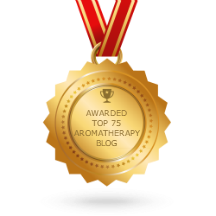Have you ever used Google Scholar to search for information? Me neither, until this week.
We decided to find some positive studies... and coincidently my friend Liz Tams put up a Google Scholar url (which I had never heard of.) Among the positive results:
Aromatherapy as a safe and effective treatment for the management of agitation in severe dementia: the results of a double-blind, placebo-controlled trial with Melissa. (This report has had some press coverage.)
(The famous Alopecia study)
Conclusions The results show aromatherapy to be a safe and effective treatment for alopecia areata. Treatment with these essential oils was significantly more effective than treatment with the carrier oil alone (P=.008 for the primary outcome measure). We also successfully applied an evidence-based method to an alternative therapy.
Lavender increased the percentage of deep or slow-wave sleep (SWS) in men and women. All subjects reported higher vigor the morning after Thus, lavender serves as a mild sedative and has practical applications as a novel, nonphotic method for promoting deep sleep in young men and women and for producing gender-dependent sleep effects.
Nursing Times study on the emotional effects of Lavender on post cardiotomy patients. (I need to write and ask Jane which species was used, and the different results!)
Jane Buckle presents the results of a randomised, double-blind trial of two essential oils of two different species of lavender, topically applied on post-cardiotomy patients. The emotional and behavioural stress levels of 28 patients were evaluated pre- and post-treatment on two consecutive days. The therapeutic effects of the two lavenders appeared to be different: one was almost twice as effective as the other, thereby disproving the hypothesis that aromatherapy, using topical application of essential oils, is effective purely because of touch, massage or placebo.
Acupuncture, aromatherapy, and meditation may be useful for nausea/vomiting, for mild relaxation, and for pain/anxiety, respectively
Use of peppermint essential oil in treating Irritable Bowel Syndrome;
Results: Eight randomized, controlled trials were located. Collectively they indicate that peppermint oil could be efficacious for symptom relief in IBS. A metaanalysis of five placebo-controlled, double blind trials seems to support this notion. In view of the methodological flaws associated with most studies, no definitive judgment about efficacy can be given.the role of Aromatherapy in helping control chronic pain.
The use of Aromatherapy in dealing with AIDS
The use of Lavender oil (diffused) to calm agitation in patients with dementia.
Lavender oil administered in an aroma stream shows modest efficacy in the treatment of agitated behaviour in patients with severe dementia.
The response of hospice cancer patients to lavender
Antifungal activity of Tea Tree Oil
Tea tree oil was found to be able to inhibit growth of all clinical fungal isolates.
The effect of Basil oil on MRSA
The effects of various essential oils against candida. (surprisingly enough, in vitro, Sandalwood oil appears more effective than Tea Tree!)
Review of the Biological activities of Lavender Oil (methodology and lack of proper identification of the oils used hampers the clarity of results.)
The use of Holy Basil in treating acne:
The use of Spanish Sage in treating dementia
The use of essential oil containing mouthwash in controlling plaque and gingivitis (along with brushing and flossing, of course)(the abstract doesn't state which essential oils, unfortunately)
This is just a start..what was found by entering "essential oil research" in Google Scholar.
Thursday, March 13, 2008
Subscribe to:
Post Comments (Atom)


1 comment:
What terrific links! Thanks.
Post a Comment